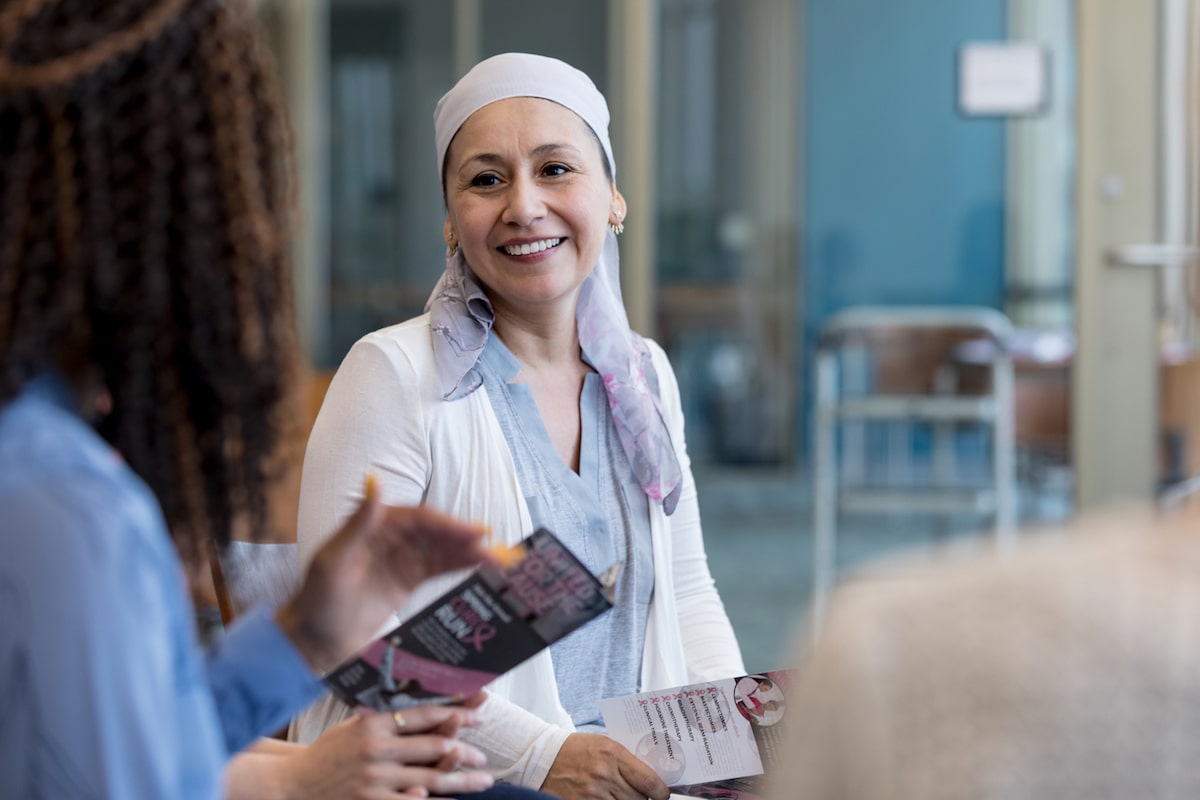<< Back
How Exercise Can Reduce Joint Pain in Breast Cancer Survivors Who Use Aromatase Inhibitors

June 08, 2020
By Gretchin Bade
Oncology Program Lead
Hartford Hospital Rehabilitation Network
Joint pain, also known as arthralgias, occurs in 50 percent of breast cancer survivors treated with aromatase inhibitors. Research has found that exercise decreases the joint pain which can be a side effect of the aromatase inhibitors, a type of hormonal therapy medicine.
Hormonal therapy is usually prescribed for 5 to 10 years after surgery.
Here are aromatase inhibitors:
- Arimidex (chemical name: Anatrozole).
- Aromasin (chemical name: Exemestane).
- Femara (chemical name: Letrozole).
These have been shown to be more effective at decreasing the recurrence risk in postmenopausal women and are now used more often than other treatments such as tamoxifen to treat women who have gone through menopause.
Usually, due to the side effects, 25 percent of women prescribed hormonal therapy to decrease recurrence risk after surgery either don’t start taking the medicine or stop taking it early.
Joint pain and stiffness, also known as arthralgias, are common side effects of aromatase inhibitors. Less common but more serious side effects of these medicines include heart problems, osteoporosis and broken bones. If doctors could find a way to decrease the joint pain caused by aromatase inhibitors, it is more likely that women would follow their treatment plans and take the medicines for the full 5-10 years.
In the HOPE study (Hormones and Physical Exercise), first presented at the 2013 San Antonio Breast Cancer Symposium, researchers wanted to see if exercise could help ease joint pain caused by aromatase inhibitors.
One group (61 women) took part in a yearlong exercise program of supervised strength training 2 times per week as well as 2.5 hours of aerobic exercise at moderate intensity, such as brisk walking.
The other group (60 women) received the usual care after being prescribed an aromatase inhibitor; a recommendation to exercise and eat healthy food, as well as monthly calls to ask the women if they were taking the aromatase inhibitor as prescribed.
Before the study began and then at specific times during the study, the women were asked to rate their worst pain, the average severity of their pain, and how much the pain affected their daily lives.
At the start of the study, there was little difference in the pain scores between the two groups of women. But after 12 months, there were significant differences:
- The worst pain scores decreased by 20 percent in women who exercised and 3 percent in women who didn’t exercise.
- The average pain severity decreased by 21 percent in women who exercised and didn’t change in women who didn’t exercise.
- The amount of pain interfering with daily life decreased by 29 percent for women who exercised and less than 1 for women who didn’t exercise.
They also found that women who exercised more or at a higher intensity received more benefits.
The researchers believe that the benefits of exercise, including increases in strength, aerobic conditioning and range of motion, as well as losing weight, all contributed to the decrease in joint pain.
Even though the side effects of hormonal therapy can be troubling, it is important to remember that hormone-receptor-positive breast cancer can come back. Hormonal therapy after surgery reduces that risk.
If you are currently taking an aromatase inhibitor, try to make exercise a regular part of your daily routine. Exercise should be thought of as another important part of your overall treatment plan to help you recover and remain healthy.
Before exercising, talk to your doctor. It may also be beneficial to meet with a physical or occupational therapist specially trained in breast cancer rehabilitation about a safe and reasonable plan designed specifically for you.
Gretchin Bade is a physical therapist, a certified Polestar Pilates instructor and Oncology Program Lead with the Hartford HealthCare Rehabilitation Network.
For more information about breast cancer treatment at the Hartford HealthCare Cancer Institute, click here.
Need to see your doctor? New Patient? For more information about Hartford HealthCare virtual health visits, click here.
Click here to schedule a virtual visit with a Hartford HealthCare-GoHealth Urgent care doctor.
Stay with Hartford HealthCare for everything you need to know about the coronavirus threat. Click here for information updated daily.
Questions? Call our 24-hour hotline (860.972.8100 or, toll-free, 833.621.0600).
Get text alerts by texting 31996 with COVID19 in the message field.